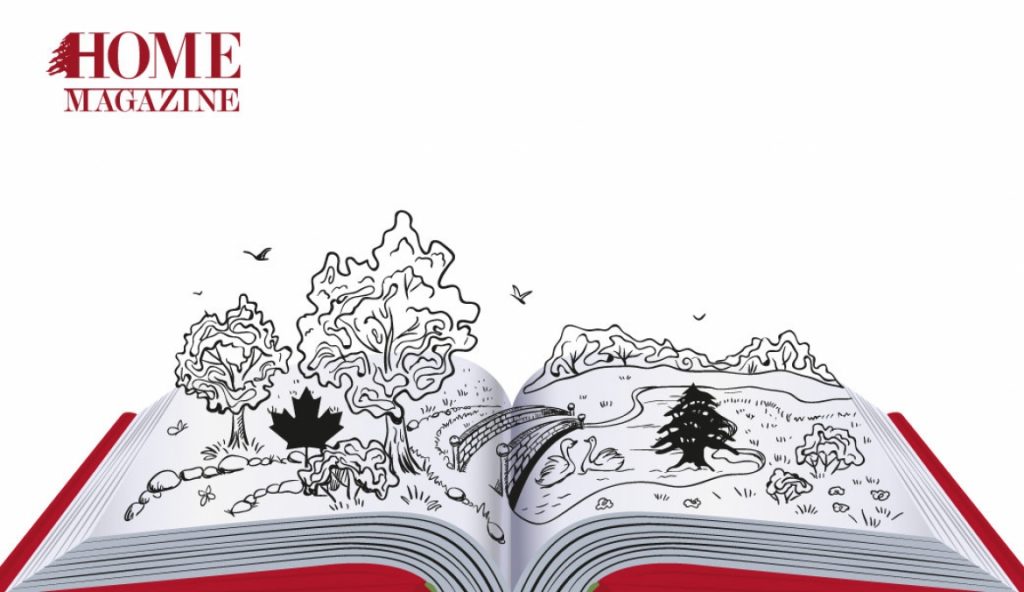A new buzz of storytelling has hit Montreal. With a Lebanese flavor that ignites a longing for the HOMEland, this activity promotes attachment to HOME.
We see a sparkle in the eyes of the children and their parents, the reading of the story begins. These are tales about the country they left behind; they awaken very strong, long-dormant emotions. The children are very curious and ask many questions. They just love being introduced to the traditions and the beautiful culture of Lebanon that are often forgotten. Storytelling is magical both for the author and the listener. Montreal is known to be a multicultural metropolis. According to the latest census, some 26% of the population of Montreal are members of a visible minority, such as Arabs, Greeks, Italians, Latin Americans, South Asians, and Chinese. Being so multifaceted, the city bursts with activities and a vast gastronomical explosion of flavors, perfumes, and colors.
In this vibrant city, the new buzz is storytelling and it has a Lebanese flavor. Lebanese-born authors unite to tell their stories in the public libraries of their adopted city. The main goal is to create a circle of words, written with love and respect for their roots, and transmitted with love.
The oriental community is responding very fast to this initiative. Authors are being asked to read at Lebanese and French schools and at festivals.
The Arab community is also reacting very favorably through increased participation. Quebeckers are attending the sessions and touched to learn more about newcomers. At the end of the reading, they often hug the author and express a very deep and felt sense of emotion. Very often they say that it is very different from the scenes of violence they see on TV and that they never suspected that the country could be so beautiful and the people so warm. They also confide that they never imagined that the cultural heritage is so rich.
Roula Ragheb Fayad starts the ball rolling with the reading of her book, Le trésor des cèdres (The Treasure of the Cedars). The action takes place in the high mountains of Lebanon, around the great cedar forest. Kamal, a young peasant, leads a laborious life filled with his love for Rosana. However, the discovery of a treasure rocks his entire existence and may reveal a great secret.
The whole activity lasts for an hour to allow questions and interactions with the author.
Frida Anbar follows with the reading of her magical tale, Les racines du cœur (The Roots of the Heart). This time, the plot begins in America. In her large and luxurious HOME, little Nina is bored. One evening, when she is feeling particularly lonely, she wanders among the Christmas decorations, her soul in unbearable pain. Out of sorrow, a tear flows, explodes, and animates a tarbouch (oriental hat) in a forgotten briefcase in the attic. The tarbouch will spend a few days with her to introduce her to the traditions and customs of her father’s native country, Lebanon. This tarbouch will take the girl on a journey to discover her family and collective past.
At the end of the reading, very frequently, listeners say that they can visualize the setting of the story from the author’s description, enabling them to connect with the plot. With every reading, the magic of Lebanon comes alive and ignites a new flame in the most vulnerable spot, the heart. The circle is complete: the author has shared, the reader has received.
What really emerges out of this activity is the love of the native land woven into the pages. Both authors and audiences are swept along by a strong wave of emotion. For the adults, it returns the soul to a forgotten past. It also shapes the Lebanese values to be transmitted to the children of the diaspora: generosity, hard work, love of the family, and the bold Phoenician heritage.
The biggest storyteller of all time, Walt Disney, once wrote, “There is more treasure in books than in the entire pirate’s loot on Treasure Island.” Why, then, deprive yourself of such delights?
As long as there have been people, there have been stories to tell. Stories are the heartbeat of every nation. They narrate the core of a country, making us feel proud. Will you come along with us next time we have a story to share?

































